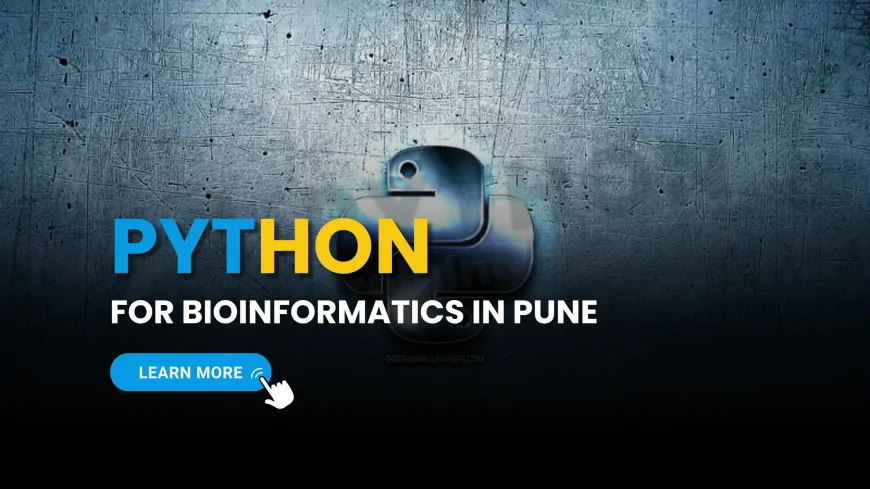Learn Python for Bioinformatics in Pune | Python for Life Sciences and Bioinformatics: Courses in Pune
Join top-rated Python for Bioinformatics courses in Pune. Learn DNA sequence analysis, Biopython, NCBI tools, and genomic data processing with real-world projects and certifications. Perfect for life science students and researchers.

Table of Contents
- Introduction to Python in Bioinformatics
- Why Learn Python for Bioinformatics?
- Applications of Python in Bioinformatics
- Course Structure and Curriculum
- Key Modules Covered
- Python Libraries and Tools Used
- Capstone Projects and Real-Time Assignments
- Top Institutes Offering Bioinformatics Python Courses in Pune
- Career Opportunities After Course Completion
- Frequently Asked Questions
- Conclusion
Introduction to Python in Bioinformatics
The fusion of biology and computer science has given rise to the rapidly evolving field of bioinformatics. As datasets in genomics, proteomics, and molecular biology grow exponentially, tools like Python are becoming essential for researchers and scientists. Pune, being a rising hub for biotech and IT industries, offers an ideal location to learn Python for bioinformatics through specialized and project-based courses.
Why Learn Python for Bioinformatics?
Python has emerged as one of the most powerful tools in the field of bioinformatics. From analyzing DNA sequences to visualizing protein structures, Python enables researchers, data analysts, and life science professionals to automate, interpret, and present biological data efficiently.
Easy to Learn and Read
Python’s clean syntax and readability make it ideal for non-programmers such as biology students or researchers who may not have a technical background. With minimal coding effort, users can perform complex biological computations.
Rich Set of Scientific Libraries
Python offers specialized libraries such as: Biopython: For sequence manipulation, alignments, accessing NCBI, BLAST, etc. Pandas & NumPy: For data manipulation and numerical analysis. Matplotlib & Seaborn: For creating high-quality plots and visualizations of biological data. These libraries eliminate the need to build everything from scratch, thereby saving time and effort.
Versatility Across Bioinformatics Domains
Python can be used in a wide array of biological research and industry applications, such as: Genomics and transcriptomics Structural bioinformatics Protein interaction analysis Epidemiological modeling Pharmacogenomics and personalized medicine
Automation of Repetitive Tasks
Python allows bioinformaticians to automate mundane tasks like parsing genomic files (FASTA, FASTQ), batch processing sequence alignments, or scraping data from public databases (like NCBI and EMBL), which would otherwise be time-consuming.
Integration with Other Tools and Languages
Python easily integrates with: R for statistical analysis SQL for structured databases APIs like NCBI Entrez and UniProt Web development frameworks for bioinformatics dashboards (e.g., Flask, Django)
Community Support and Open-Source Ecosystem
With a growing global community in both biology and computer science, Python boasts extensive documentation, tutorials, forums, and open-source bioinformatics tools, making it easier to find support and collaboration.
Supports Big Data and AI in Biology
Python’s frameworks like TensorFlow, Keras, and Scikit-learn make it perfect for integrating artificial intelligence in bioinformatics—such as classifying gene sequences, predicting protein functions, or identifying disease markers.
Python empowers biologists to transition into computational roles and solve high-impact problems in healthcare, genetics, and drug discovery. It’s a future-proof skill for the data-driven age of biology.
Applications of Python in Bioinformatics
DNA sequence alignment and comparison Genome annotation and mutation analysis Protein structure prediction Molecular docking simulations Microbiome data visualization Building genomic data pipelines Python helps solve real-world biological problems through automation and reproducible workflows.
Course Structure and Curriculum
A typical Python for Bioinformatics course in Pune is structured into beginner to advanced levels: Introduction to Bioinformatics & Genomics Basics of Python Programming Working with FASTA, FASTQ, and PDB files Regular expressions in genome parsing Accessing NCBI/EMBL data using APIs Sequence alignment (BLAST, ClustalW) Visualization using Matplotlib & Seaborn Use of Jupyter Notebooks and Git Courses often offer a mix of lectures, lab sessions, and collaborative research mini-projects.
Key Modules Covered
1. Python Fundamentals
Loops, functions, data structures, error handling, object-oriented programming.
2. Biopython & Sequence Analysis
Bio.Seq, Bio.Align, Bio.Phylo for processing gene/protein sequences.
3. Working with Biological Databases
NCBI Entrez utilities, PDB, and local flat-file databases.
4. Data Wrangling with Pandas
Handling large datasets, missing data, filtering genetic markers.
5. Machine Learning in Bioinformatics
Classification of sequences, clustering genes, ML for drug discovery.
Python Libraries and Tools Used
Python's flexibility and extensive scientific ecosystem make it the top choice for modern bioinformatics. Whether you're parsing gene sequences or building machine learning models for biological insights, these libraries and tools are indispensable:
1. Biopython
A specialized library that provides tools for biological computation, including: Sequence parsing (FASTA, GenBank, etc.) BLAST queries Phylogenetic tree construction Accessing biological databases (NCBI, UniProt) Use Case: Fetch and align DNA sequences, analyze genetic mutations.
2. Pandas
An essential data analysis library that simplifies handling of biological datasets like: Gene expression tables SNP and mutation datasets Omics data integration Use Case: Clean, filter, and analyze tabular genomics data.
3. NumPy
Supports high-performance array operations and matrix computations, ideal for: Gene correlation matrices Statistical biological data processing Use Case: Perform genome-wide association studies (GWAS) or matrix-based protein modeling.
4. Matplotlib & Seaborn
These libraries allow creation of publication-quality plots: Heatmaps for gene expression Sequence motif visualization Mutation frequency graphs Use Case: Visualize trends in omics data or protein structures.
5. Scikit-learn
A machine learning toolkit used in bioinformatics for: Sequence classification Predicting protein interactions Gene clustering Use Case: Build predictive models for genetic disease classification.
6. Jupyter Notebook
An interactive coding environment ideal for: Research reports Sharing visualizations and code Documenting experiments Use Case: Create real-time bioinformatics analysis notebooks with code + output.
7. NCBI Entrez & E-utilities APIs
Python scripts can access biological databases through APIs: PubMed articles Gene and protein records Taxonomy information Use Case: Automate large-scale literature or gene database mining.
8. Plotly & Dash
Interactive data visualization libraries useful for building dashboards: Live data exploration Network biology visualization Comparative genomics tools Use Case: Create dashboards for exploring genome structure and expression data.
9. PyMOL (with Python scripting)
Used for 3D visualization and scripting of protein and molecular structures. Use Case: Visualize protein folding, ligand binding, and docking simulations.
10. RDKit
A cheminformatics toolkit integrated with Python for: Molecular structure analysis Chemical fingerprinting Drug-likeness scoring Use Case: Screen potential drug molecules against protein targets.
Final Thoughts: These Python libraries and tools are not just supportive—they are transformative. They bridge the gap between biological questions and computational answers in the world of modern bioinformatics.
Capstone Projects and Real-Time Assignments
Projects help apply theoretical learning in real-life: Build a tool to fetch and align genetic sequences from NCBI. Visualize protein domains using Python and 3D modeling. Create a mutation finder tool to identify SNPs in gene sequences. Analyze microbiome data from environmental samples using Python pipelines.
Top Institutes Offering Bioinformatics Python Courses in Pune
1. Webasha Technologies
Webasha Technologies in Pune has established itself as a leader in niche IT and domain-specific training. Their Python for Bioinformatics course is designed for biology graduates, researchers, and working professionals looking to automate and analyze biological data using Python.
Key Features:
-
Hands-on training with Biopython, Pandas, NumPy, and Matplotlib
-
Real-world projects in genomics, transcriptomics, and protein analysis
-
Integration with NCBI APIs, BLAST, and FASTA data formats
-
Live interactive sessions and lifetime access to resources
-
Guidance for academic projects, publications, and career transitions
Certification:
Industry-recognized certification aligned with biotech, pharma, and research standards.
Placement Support:
Includes resume-building, mock interviews, and access to bioinformatics recruiter networks.
Why Choose Webasha for Bioinformatics in Pune?
-
Domain-Specific Curriculum: Tailored for life sciences students, not generic programming courses
-
Career-Oriented: Focus on employability, research skills, and freelance consulting
-
Expert Trainers: Faculty with dual experience in biotech research and Python development
-
Flexible Batches: Online, offline, and weekend formats available
-
Mini Projects: Genome annotation, protein modeling, mutation mapping
Career Opportunities After Course Completion
Completing a Python for Bioinformatics course in Pune opens the door to a wide range of high-demand roles at the intersection of biology, data science, and technology. As life sciences become increasingly data-driven, Python proficiency has become a critical skill in biotech, pharma, academia, and healthcare research.
1. Bioinformatics Analyst
Work with biological datasets to analyze DNA/RNA sequences, gene expression data, and molecular structures. Common employers include research institutions, hospitals, and bioinformatics startups. Key Skills: Biopython, NGS data analysis, genomic pipelines
2. Computational Biologist
Apply Python to model biological systems, simulate cellular behavior, and build predictive models using real biological data. Key Employers: Pharmaceutical companies, genomics labs, CROs (Contract Research Organizations)
3. Genomics Data Scientist
Analyze large-scale sequencing data to uncover genetic markers, mutations, and disease associations. Often work on population genetics or clinical genomics. Tools Needed: Pandas, NumPy, SciPy, Biopython, Scikit-learn
4. Research Assistant / Academic Researcher
Support laboratory research through computational experiments, bioinformatics tool development, and scripting biological workflows in Python. Workplaces: IITs, universities, research institutes like IISER and NIBMG
5. Pharmaceutical Data Engineer
Build automated pipelines and data engineering solutions for managing drug discovery datasets, compound libraries, and screening results. Tools: Python, SQL, APIs, Docker
6. Biomedical Software Developer
Develop Python-based bioinformatics tools, web applications, and custom scripts for labs or bio-software companies. Tech Stack: Flask, Django, REST APIs, Biopython
7. Machine Learning in Healthcare Specialist
Use Python to build machine learning models for tasks like disease prediction, protein folding, or personalized medicine. Must-Know: Scikit-learn, TensorFlow, bioML datasets
8. Clinical Data Analyst
Work with hospital or clinical trial data, using Python to ensure accuracy, manage electronic health records (EHR), and extract medical insights.
9. Bioinformatics Consultant (Freelance)
Offer services like pipeline creation, data preprocessing, sequence alignment, or dashboard development for clients globally. Ideal For: Freelancers and remote workers with deep bioinformatics experience.
10. Further Education & Research
After completing the course, many learners pursue: Master’s in Bioinformatics PhD in Computational Biology International fellowships in genomics, biotech, or AI in healthcare
Conclusion: With Python as your core skill, you're equipped to thrive in a variety of career paths in bioinformatics and computational biology. Whether entering industry, research, or entrepreneurship, the opportunities are vast and growing rapidly with the advancement of precision medicine and genomics.
Frequently Asked Questions (FAQs)
1. What is bioinformatics?
Bioinformatics combines biology, computer science, and data analytics to analyze biological data such as genomes and protein sequences.
2. Why is Python popular in bioinformatics?
Python’s simplicity and strong scientific libraries like Biopython make it ideal for processing biological data.
3. Do I need a biology background to learn this course?
Not mandatory, but basic knowledge of molecular biology is helpful for context.
4. Is Python difficult to learn for life science students?
No. Python is beginner-friendly and ideal for life science professionals venturing into coding.
5. What is Biopython?
Biopython is a collection of tools for biological computation, used for sequence parsing, alignment, and database queries.
6. Are there job opportunities in Pune after completing the course?
Yes. Pune has a growing number of biotech startups, research institutes, and pharma companies hiring bioinformatics professionals.
7. What kind of projects will I work on?
Projects may include gene analysis, NCBI data scraping, sequence alignment, and protein modeling.
8. How long does the course take?
Typically 2–3 months for certification programs and 4–6 months for diploma-level training.
9. Can I take this course online?
Yes. Most institutes in Pune offer both online and offline modes with live mentoring.
10. Will I get a certificate?
Yes. Most reputed training centers offer an industry-recognized certificate upon course completion.
11. Are internships available?
Some institutes offer internship opportunities or industry project tie-ups for experience.
12. Is Python enough, or do I need R as well?
Python alone is sufficient for most workflows, but R can be complementary in statistical modeling.
13. Can I get placement assistance?
Yes. Webasha and other Pune-based institutes provide resume building, interview training, and placement help.
14. What is the fee for the course?
The average fee ranges from ₹15,000 to ₹45,000 depending on the duration and institute.
15. What are the prerequisites?
Basic computer skills, high-school-level biology, and a willingness to learn coding.
16. What tools will I learn apart from Python?
Git, Jupyter, MySQL, NCBI APIs, command-line tools, and some visualization platforms.
17. Are there advanced levels after this course?
Yes. Advanced machine learning, drug discovery modeling, and structural bioinformatics can be pursued next.
18. Is this course suitable for MSc/BSc life science students?
Absolutely. It is tailored for graduates, postgraduates, and PhD scholars in life sciences.
19. Can I pursue research after this training?
Yes. Python skills can significantly strengthen your research profile for MPhil/PhD applications.
20. Will I need a high-end laptop for this course?
No. Any basic laptop with internet and Python IDEs installed is sufficient.
Conclusion
Python is not just a programming language—it’s a scientific instrument in modern biology. With Pune's academic strength, IT infrastructure, and growing biotech scene, it offers unmatched opportunities to master Python for Bioinformatics. Whether you're a student, researcher, or professional, learning Python in this context can open doors to high-impact, data-driven biological research and career growth.
What's Your Reaction?
 Like
0
Like
0
 Dislike
0
Dislike
0
 Love
0
Love
0
 Funny
1
Funny
1
 Angry
0
Angry
0
 Sad
0
Sad
0
 Wow
0
Wow
0














